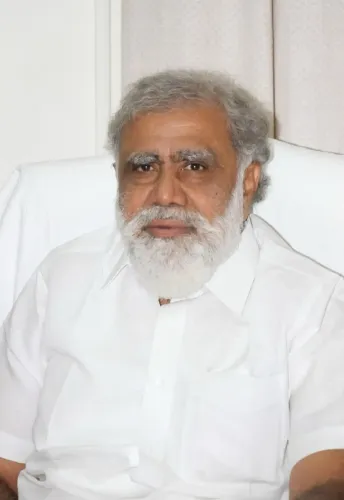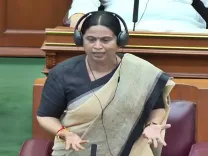How Did India Successfully Thwart Pakistan's Drone and Missile Attack on Jammu, Pathankot, and Udhampur?

Synopsis
Key Takeaways
- The Indian Armed Forces effectively neutralized a large-scale drone and missile attack from Pakistan.
- Key military installations in Jammu, Pathankot, and Udhampur were targeted.
- India's response included both kinetic and non-kinetic means as per standard operating procedures.
- Operation Sindoor was launched in response to earlier terrorist attacks.
- Diplomatic channels remain crucial in de-escalating tensions between India and Pakistan.
New Delhi, May 9 (NationPress) In light of the rising tensions between India and Pakistan, the Indian Armed Forces have effectively thwarted a significant drone and missile offensive initiated by Pakistan, targeting various military installations in Northern and Western India, which include Jammu, Pathankot, and Udhampur, according to the Headquarters Integrated Defence Staff (HQ IDS).
The HQ IDS shared on X: "Military stations located in Jammu, Pathankot, and Udhampur, which are near the International Boundary in Jammu & Kashmir, were targeted by Pakistan utilizing missiles and drones. Fortunately, there were no losses. The threat was neutralized by the #IndianArmedForces following standard operating procedures (SoP) using both kinetic and non-kinetic methods."
This renewed offensive and intensified shelling from Pakistani forces along the Line of Control and the International Border in Jammu and Kashmir, Punjab, and Rajasthan came in response to India's preemptive strike on Thursday morning on Pakistani air defense systems in various cities, including a successful neutralization in Lahore.
The Indian military reacted promptly and effectively, neutralizing the threat through both kinetic and non-kinetic strategies as per established protocols.
The Ministry of Defence reinforced that any assault on India's military installations would be met with a "suitable response." Foreign Secretary Vikram Misri stated that Pakistan alone can choose to de-escalate tensions, as New Delhi reacted to the initial escalation caused by the Pahalgam incident.
Power outages affected numerous cities and towns in Jammu and Kashmir, Punjab, and Rajasthan as drones were spotted crossing the border.
During a press briefing at the Ministry of External Affairs, Colonel Sofiya Qureshi confirmed that India's Integrated Counter-UAS Grid and Air Defense systems effectively thwarted the assaults.
"This morning, the Indian Armed Forces conducted operations against Air Defense Radars and systems at several locations in Pakistan. Our response matched the intensity of Pakistan's actions. It has been reliably reported that an Air Defense system in Lahore has been neutralized," Colonel Qureshi stated.
She elaborated that during the night of May 7 to 8, Pakistan made attempts to target military facilities at various sites, including Awantipura, Srinagar, Jammu, Pathankot, Amritsar, Kapurthala, Jalandhar, Ludhiana, Adampur, Bathinda, Chandigarh, Nal, Phalodi, Uttarlai, and Bhuj.
However, India's robust air defense mechanisms successfully neutralized all attempted incursions, with debris from intercepted drones and missiles being recovered from multiple locations, confirming the assaults.
The missiles targeted critical sites, including Satwari (Jammu Airport), Samba, R.S. Pura, and Arnia, as reported by defense sources.
A sudden blackout plunged Jammu city into darkness following two loud explosions, likely resulting from the interception of intruding drones. Immediately after, sirens echoed throughout the city, prompting panic-stricken residents to seek shelter.
Massive explosions were heard in Jaisalmer, and blackouts were enforced in western districts of Rajasthan bordering Pakistan, plunging the entire area into darkness, as reported by police.
This escalation followed India's launch of Operation Sindoor, a targeted series of strikes on nine terror camps located in Pakistan and Pakistan-Occupied Kashmir (PoK) in retaliation for the April 22 terror attack in Pahalgam that resulted in 26 fatalities.
"Our actions have been focused, measured, and non-escalatory. No Pakistani military installations have been targeted. India has exhibited significant restraint in choosing targets and executing operations," the Ministry of Defence noted on Wednesday.
During a media briefing on Thursday, Colonel Qureshi reiterated that on May 7, India made it clear that any attack on Indian military assets would be met with a "suitable response."
Following Operation Sindoor, the Union government convened an all-party meeting on Thursday at the Parliament Annex to brief political leaders about the security situation and India's calibrated military actions.
Union Defence Minister Rajnath Singh led the briefing, attended by Union Home Minister Amit Shah, BJP President J.P. Nadda, Congress President Mallikarjun Kharge, and Leader of the Opposition in Lok Sabha Rahul Gandhi, among others.
Foreign Secretary Vikram Misri, Colonel Sofiya Qureshi, and Wing Commander Vyomika Singh also addressed the press after the all-party meeting.










